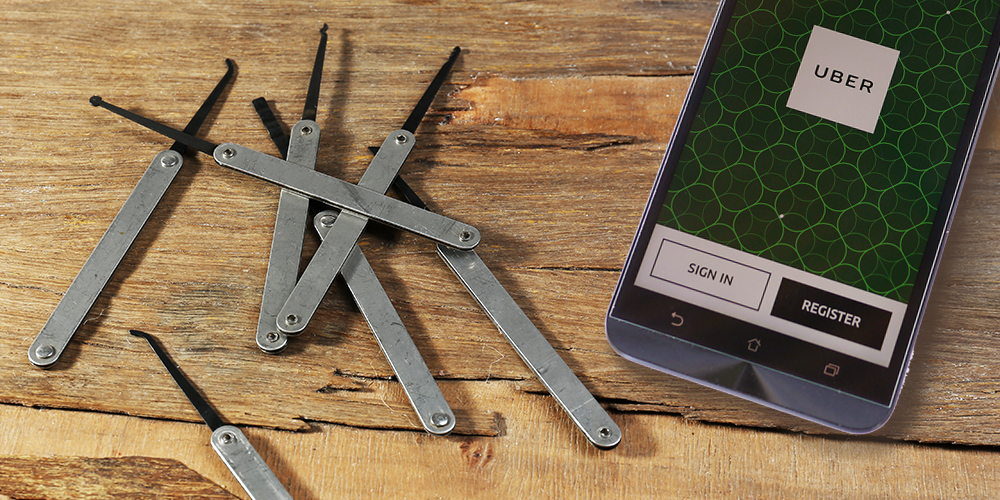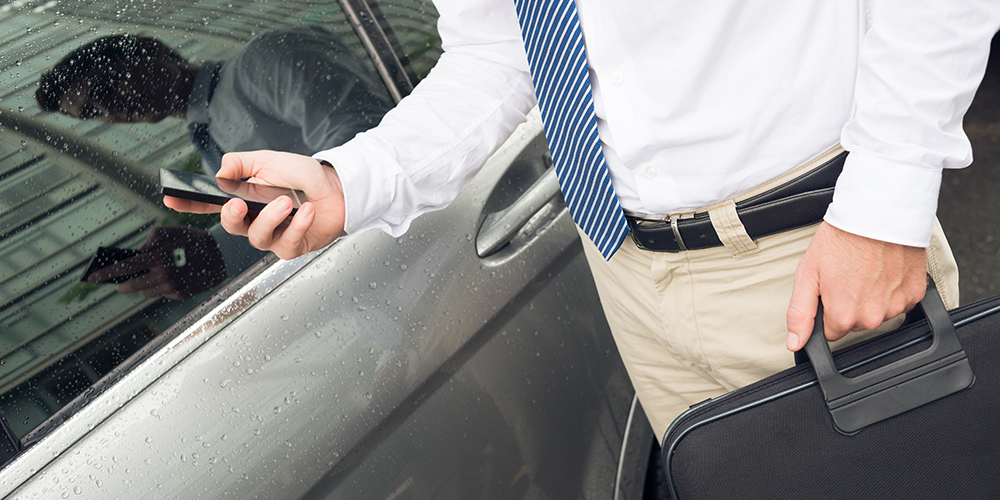Lock Blog
A resource for consumers, locksmiths, and security professionals
A resource for consumers, locksmiths, and security professionals

The Uber model has become an alluring strategy for many emerging start-ups. There is flexibility for the workers and the business. There is a sense of youthfulness about your company seeming hip as they hop on the trend. And it is a very good elevator pitch. Just like the elevator pitch for Alien was, “it is like Jaws…in space,” saying that your company is like Uber for whatever industry, garners you attention. The response is something along the lines of, “What? You are like that very successful company paired with that very profitable industry. Tell me more.”
Well, that is how it used to be. Nowadays people are pretty quick to dismiss something with the Uber model. It is the Helvetica of start-ups. Everyone is using it, so everyone is tired of it. But is this lack of interest justified? Should we stand up and take note of all of the Uber-like businesses? I think that everyone trying something different deserves a glance if to do nothing more than learn from their mistakes. Though the title of this article may lead you to my coming conclusion, I have tried to be as fair as possible in my analysis.
“D” Sharma, Kohannah Soto, and Ray Wang have created, LockedOut, the Uber of Locksmithing. LockedOut is a new business, an app, and a noble dream. The idea, as you may have surmised, is to become the Uber of the Locksmith industry. The app will be downloaded onto your phone and from there you can track your locksmith and pay for the service all on the same platform. Their company mission is a fantastically simple and meaningful goal: Make it easier, safer, and cheaper to use the services of a mobile locksmith. If you do any research on the company, chances are you will see Ray Wang on the comments section answering questions. This is some great marketing, that really seems to be working. After Ray addresses their questions, most of the dissenters end with a newly found belief in the company. I have also seen comments from locksmiths saying that this sounds like a good idea. So everything things sounds good, right? Ethical company values, transparency in the company is inspiring confidence, and all in all, people seem to like the idea. So we are done here, right? No. Things are never that easy.
Based off the existing demand for at will transportation that the taxi industry had created, with the added benefit of going up against a very regulated industry, Uber has been a major disruption. The taxi industry was, however, regulated for good and bad reasons. They placed limitations on the amount of licenses that could be given in certain areas. Their idea was to control the market with the excuse of increased safety, accessibility for users, etc. In order to get a taxi license, you would have to jump through some considerable hoops, and need the assistance of some nepotism or cronyism. In some cases, you would need to pay a million dollars. A MILLION DOLLARS to become a taxi driver.
This is all done to keep taxi prices at a fixed rate. Regulation enforced for the sake of exploitation. So when Uber came along to offer an alternative there was an industry that was set up to be replaced. They had lobbied to control their own industry and failed to predict the rise of something analogous to what they offered. Now they fight Uber and lobby for this disruptive company to be regulated. The market was primed for someone to act in spite of the injustice, giving people what they wanted and opening their eyes to the monopoly that existed in the current industry.
So what did the success of Uber do to the rest of the business world? It did the same thing that all successful ideas do. It created copycats. Some companies tried to just duplicate Uber, with the car service. They would make minor changes much like the difference between social networks. Appeal to a different demographic or just try and do the same thing, but offer a better user experience. Then the young start-ups created the pitch, “It’s like Uber for [Insert industry here].” The idea is to disrupt the status quo of an industry. More specifically, you want an app that people have pre-installed in their smartphones.
If it is accessible and pre-installed, then you can count on the continued usage. Once you have a reliable customer base, then you get private contractors that are not costing you any money to keep around (besides some insurance and perhaps some initial training costs). In fact, your workforce does not make any money unless they are making you money. Essentially you want to become the middle man for the industry you are disrupting. A car is used, a flower is purchased, a locksmith is used, and you get a percentage of the sale that has taken place. The only thing that is required by the overseeing company is to screen workers and remove the bad ones that get through the screening.
If we look at the rise of the company, and the niche they were capitalizing on, we can start to see the problem of transferring this model to different industries. Because this is a locksmith blog, we are going to focus on the transfer of this model to the locksmith industry. Let us just look at the jobs that these technicians of LockedOut will be doing compared to the job of a driver for Uber. Also, let us look at the type of management needed for assured customer care, and technician oversight.

With this business, you are not really taking the Uber Model. Uber worked because they were taking over an industry by using a method of business to consumer sales that the customer was already aware of. You are going to need a car to get around and you don’t want to rent one. Well, then you need the number for a taxi. Try to carry over that same idea to a locksmith. People will go on their phones to compare prices, and even get a locksmith’s number. That is about where the similarities end. The mental state of a locksmith customer, in an emergency lockout situation, is stressed. They can try and be as calm as they like, but it is a stressful situation. Many people have been quick to point out that no one is going to need a locksmith so often that it makes sense to waste data in your phone for a locksmith specific app. This is not necessarily true. Some people that get locked out, get locked out often. It is a small market, but it exists. However, how do you intend to get this very small market?
These locksmiths would be almost like subcontractors (same as the industry standard for emergency services) for LockedOut. So if you are going to call a locksmith over and over wouldn’t you want the same one that you liked? Would it not make sense to get the number of the licensed professional, who most certainly has their own business? Sure you can use the app to weed out the scammers (after some complaints), but how can you retain the best locksmiths? This business seems to be jumping into the same problem Uber has found themselves in only recently. I have several friends, young and old, who are Uber drivers. Well, they were. They were good at it, and they built up a rapport with a hotel, then they sold their cars to get a town car. Then before you know it, they are making straight profit.
Uber had been retaining those people, but what happened is exactly what happens when you tell someone about flexibility and then give them bureaucracy. And that is driving. Locksmithing is something that takes skills that need to be learned and refined in spite of a daily commute (not learned by your commute). Replacing a locksmith, especially a good one, is significantly harder than replacing a driver. And how can a common person accurately asses the work their locksmith does? How will a common person be able to verify that their locksmith accurately rekeyed locks? It is not enough to know that a locksmith was late, rude, or even attempted to price gouge. You need to know that the security of the customer still remains effective.

There seems to be the issue of professional retention, and customer retention rates. That would also come after the hurdle of changing the face of the industry to something where people did quite a bit of advanced planning of their lockouts. The competition for advertising in the industry also lends itself more toward an immediate purchase. In the case of this app, you would need them to download and install it.
I would hope that the final version requires no setup time, but you will still have to then contact the locksmith, or in this case the company that will contact the locksmith. The point of return seems just far away enough to deter most people looking for a quick and professional solution. The only comment I have seen by the company that addresses this is Ray Wang stating, “as you gain more customers, you aggregate demand through both word of mouth and mediums like Yelp where you accumulate rank through more reviews. If you were one of the top 5 entries in Yelp in all the cities, you would have more than enough customers.”
The biggest question is, how is this new company going to handle bigger names offering the same key aspects of the LockOut service. Of the top of my head, Yelp is offering transactions. In 2013 Yelp implemented food delivery, but the plan is to start moving into other markets, “categories like spas, salons and dentist appointments.” There is even a developer’s page to contact the company if you want to partner with them. Yelp is a big player with a lot of people using it as the method of finding businesses they would like to use. Yelp transactions will span all types of businesses, and there is more than the threat of a lockout to prompt a download. This is the biggest issue for me. And how do you answer the question of competition in an emerging marketplace? The only way I can think is with time. But as it stands currently, the need to download an app that will rarely be used seems like it can easily be dwarfed by a more diverse service app. If the founders of the company are hoping for Yelp to send their app business, I would be concerned on what their plan is over take Yelp.
It seems like too small a niche of tappable market. Don’t get me wrong, tons of people need a locksmith, but this requires planning for an emergency. That is just not the cultural norm. The task of changing a culture is monumental. Right now Uber is taking advantage of the seemingly limitless number of people with the limited skill set of driving. They can get these people because the required skills are basic and the requirements for entry are not very demanding.
A locksmith cannot be replaced by some person with a driver’s license and a car, there are more important skills that every locksmith has to possess. How are the customers going to be retained for an emergency service? How are locksmiths going to be retained if they can’t retain customers? So it looks like the Uber model could work for locksmiths, but I think limiting the app to only locksmiths is a bad idea. Diversification in services offered seems necessary to encourage someone to install an app in their smartphone. The business model seems predicated on the hope that Yelp will not enter the space. At this moment I remain skeptical, but still hopeful. I think that this is a bad idea, but I hope I am wrong.
Category: Automotive, Commercial, Residential